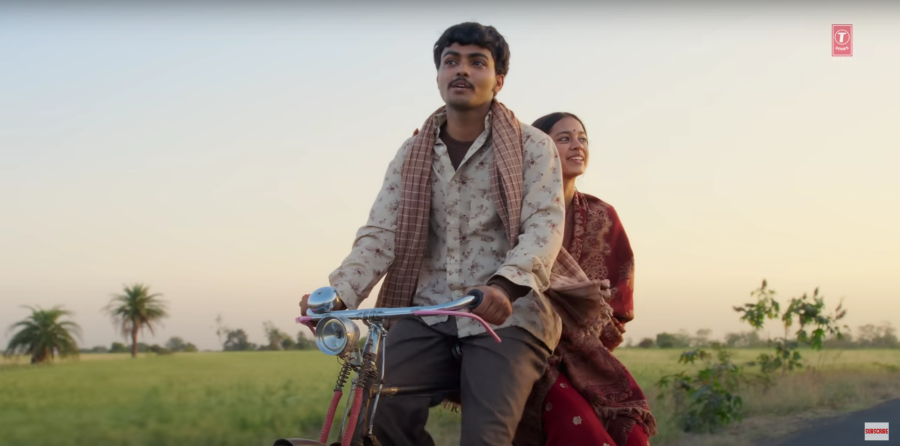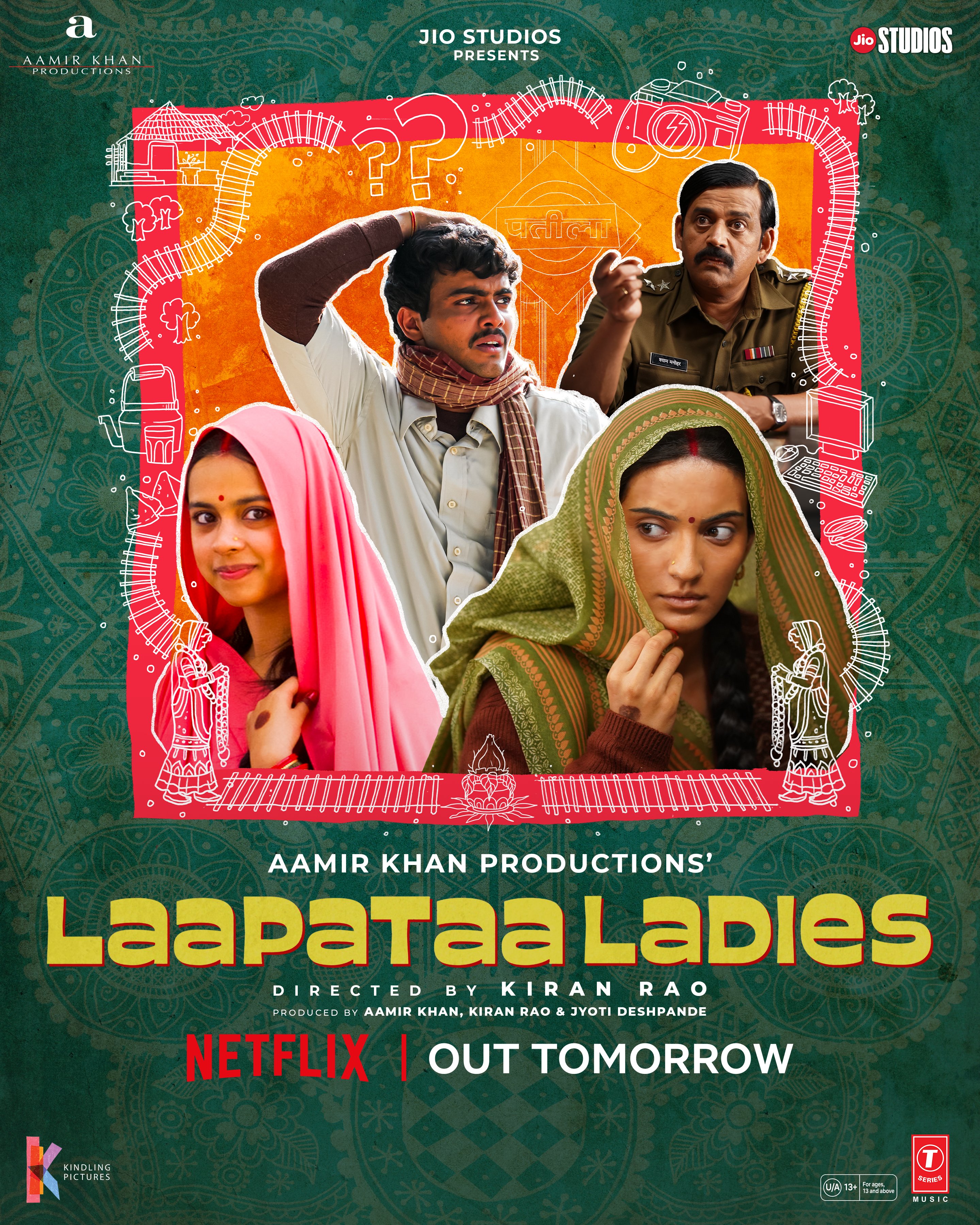Movies
More than just a story of missing brides
‘Laapataa Ladies’ brings together social messages, humour, satire and an engaging storyline.
Aarati Ray
‘Laapataa Ladies’ revolves around the chaotic story of ‘bride swapping’ in the fictional region of Nirmal Pradesh, set in 2001. You know how, in temples, amidst rows of similar-looking shoes, we might mistakenly take someone else’s shoes home?
Well, something similar happens in this movie, except Deepak (Sparsh Shrivastav), the protagonist, mistakenly brings home the wrong bride. Sounds absurd, doesn’t it?
You might wonder how such a mix-up could occur. Even Deepak’s father questions the same thing when they discover their daughter-in-law has been swapped. ‘Laapataa Ladies’ thrives on this very absurd tale of missing brides. The movie finds the ideal balance between social critique and entertainment at a time when films like ‘Animal’ have sparked controversy about which should come first.
It brings together social messages, humour, satire and an engaging storyline without letting any element overshadow the others. It’s lighthearted and neither overly preachy nor excessively comedic, ensuring the gravity of the situation remains intact.
The movie directed by Kiran Rao, kicks off with contrasting characters: a cheerful Deepak and a sombre Phool (Nitanshi Goel) getting married.
From the start, with its quirky and lively music, the movie sets a light-hearted tone, almost like a fun sitcom. As the tune of ‘Saton janam ka ticket he liya’ echoes in the background from the song ‘Beda Paar’, Deepak leads his new bride, Phool, towards the bus stand.
The story’s main conflict is hinted at when Phool stumbles and an elder says, “Once you wear a ghoonghat (veil), you should learn to walk by keeping your eyes to the ground”. It suggests she should follow her husband’s lead and not look ahead.
Conflict arises when Deepak accidentally brings home the wrong bride, Puspa (later revealed as Jaya). The moment of realisation that the wrong bride has arrived is both comical and serious, leaving Deepak reeling while his young nephew, Bablu, innocently starts singing, “Chachi badal gayi” (Aunt has been swapped).
Thus begins Deepak’s frantic search for his wife, who finds herself alone and frightened at the train station.
The main highlighting point of the movie is the dynamics, diversity and parallels between different characters and the trajectory of character development.
The female characters in the film offer different perspectives on life and feminism. Consider Phool, who is initially portrayed by Manju Mai as a timid and innocent young lady who has fallen prey to the long-standing “fraud” of “bhale ghar ki beti bahu” (coming from a ‘respectable’ family).
Phool initially prides herself on being polite and “decent”, having been taught to fulfil all expectations in her in-laws’ home, despite not knowing the address of her marital home.
Initially, she couldn’t even bring herself to say her husband’s name, feeling it was improper. But her journey from that timid woman to boldly shouting his name at the station and running into his arms is incredibly powerful.
When Phool keeps her first earned money in her dupatta and ties the knot, it’s a beautiful yet powerful moment symbolising her independence. Her declaration, “No matter how small, I will start doing something to earn when I reach home,” is a powerful portrayal of a woman taking control of her destiny and asserting her autonomy.
However, Puspa/Jaya (Pratibha Ranta) is nothing like Phool. She is outspoken and values her education over marriage. Unlike Phool, she has no hesitation in mentioning her husband’s name and is confident in making plans, even if it means deceiving others.
Initially, Puspa plans to use the bride-swapping situation to hide at Deepak’s house, temporarily. She aims to find a way to pursue her studies in the city and avoid being sent back to her forced marriage.
But as she discovers Deepak’s love for Phool, we witness character growth in her as she realises the significance of their marriage and assists in finding Phool. Similarly, Manju Mai’s (Chhaya Kadam) character is another memorable one.
She is confident and single, living happily with her cat. She helps Phool realise the importance of independence and in her way, promotes feminist ideals.
Phool’s transformation from naivety to confidence, Puspa’s evolving perspective on marriage, and Manju Mai’s contentment with a solitary life all symbolise women’s freedom and autonomy.
It’s a message that a woman’s decision to marry doesn’t diminish her feminism, nor does choosing to be single make her more feminist or someone who despises men. It’s all about women having the freedom to make their own choices.
The movie also contrasts two male characters, Deepak and Pradeep, to highlight patriarchal flaws. Pradeep, Puspa’s husband, prioritises dowry over his missing wife, resorts to violence and objectifies women. There are hints his first wife might’ve been killed for dowry.
Contrastingly, Deepak, despite societal norms, respects Phool and Puspa’s wishes and dreams. While Pradeep represents patriarchy’s negative aspects, Deepak offers hope as a man who challenges and can break free from this harmful system.
Among the supporting cast, Ravi Kishan playing Shyam Manohar adds charm to the movie with his quirky and humorous stand as a cop. The movie features beautifully executed shots, such as Deepak and Phool running towards each other in the station, which has become a new favourite scene of mine, akin to ‘Ja Simran Ja’.
Similarly, the ending scene where Puspa (Jaya) boards the bus while bidding goodbye to her new journey in studies is powerful. The parallel between her happy face and the bus leaving, juxtaposed with Deepak and Phool walking hand in hand, with Phool’s veil falling on her shoulder, sends a strong message.
It symbolises that despite different paths and choices, both women make empowered decisions. Throughout the film, scenes often switch between Puspa and Phool, highlighting their shared journey of change.
‘Laapataa Ladies’ is more than just a story about missing brides; it’s about Phool and Puspa discovering their missing pieces of empowered selves and forming a strong bond of sisterhood and support for women. It is also Deepak’s journey of finding the missing piece of standing against patriarchy.
The film doesn’t just depict Phool’s transition from being veiled to unveiled; it also strives to unveil patriarchy, harmful practices of dowry, domestic violence and unfair gender roles. The movie does so without coming across as too serious—with humour and subtlety.
The movie does have its flaws, such as a slow-paced rising action that may not be as impactful as desired. There are also questionable things like the characters portrayed by Goel and Ranta, who appear overly tanned, almost as if they're wearing brown makeup.
While some viewers may struggle to connect with both Phool and Puspa equally, the movie is a shining example of women telling women’s stories. In Indian and South Asian cinema, where women’s stories are often overshadowed, this is a significant change.
Laapataa Ladies

Director: Kiran Rao
Cast: Nitanshi Goel, Sparsh Shrivastav, Pratibha Ranta
Year: 2024
Language: Hindi
Run-time: 2 hr 4 min
Available on Netflix




 14.24°C Kathmandu
14.24°C Kathmandu












